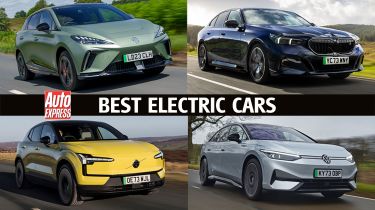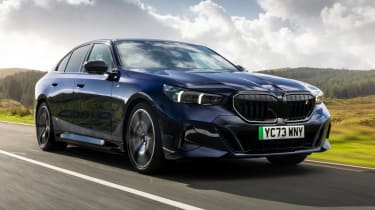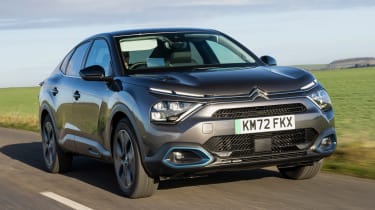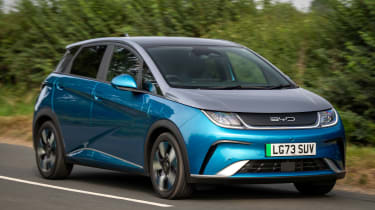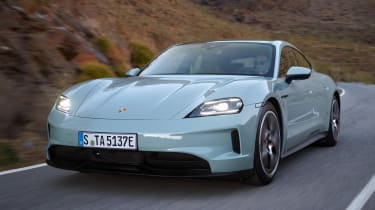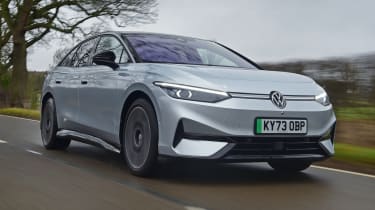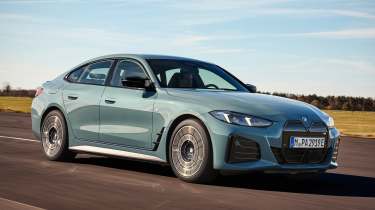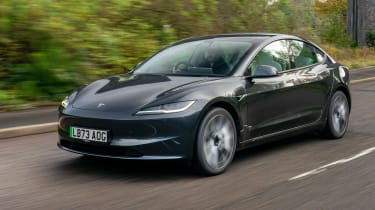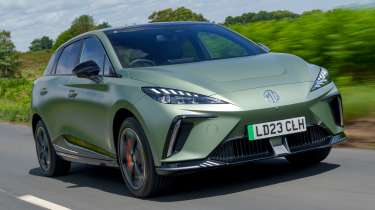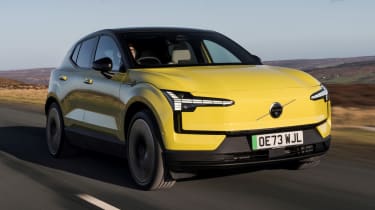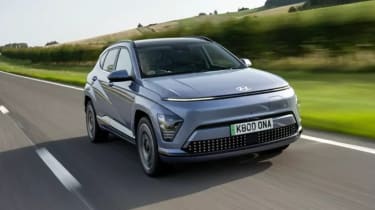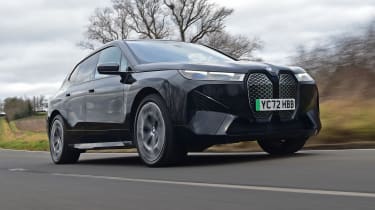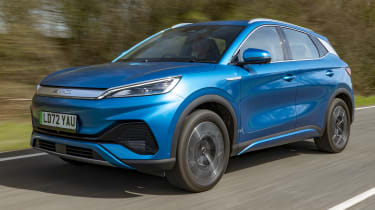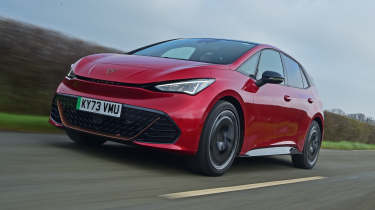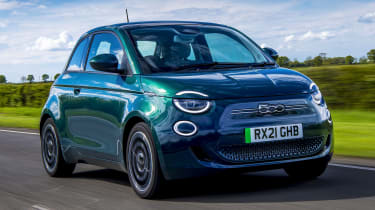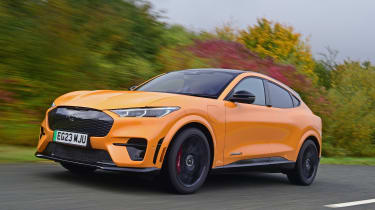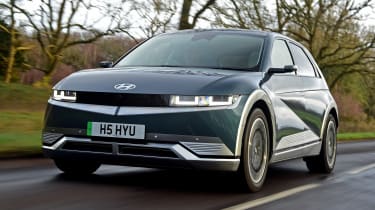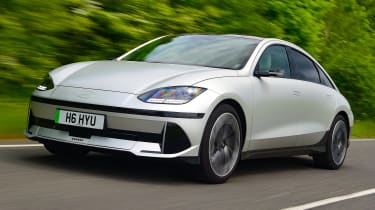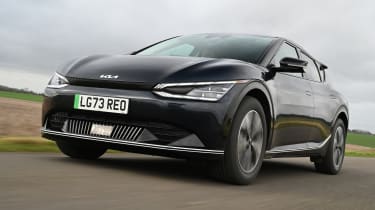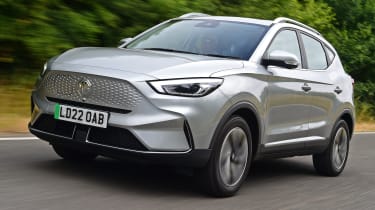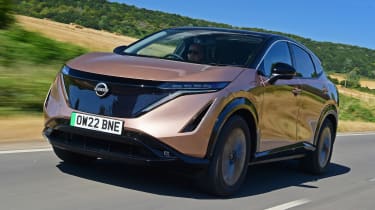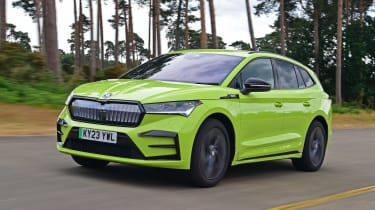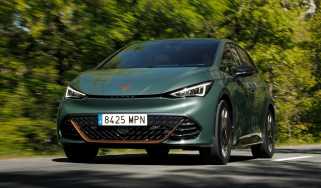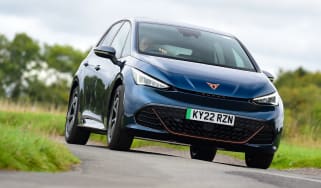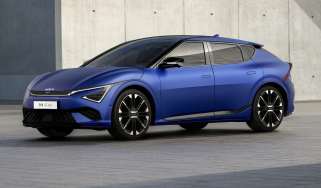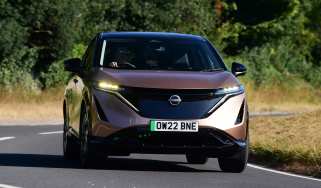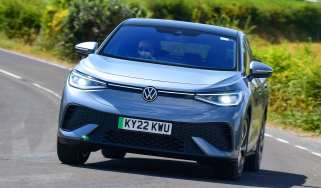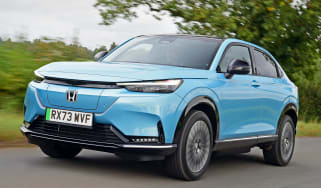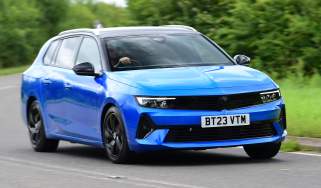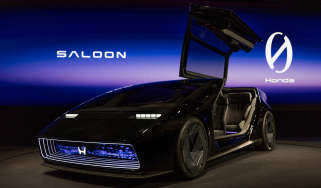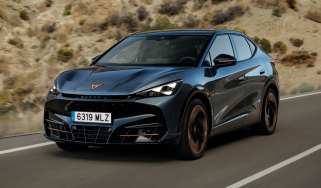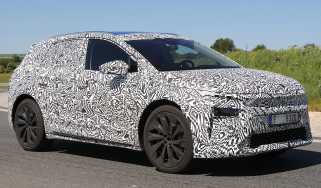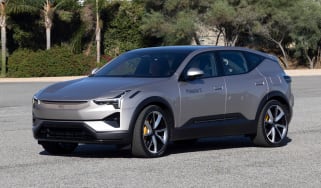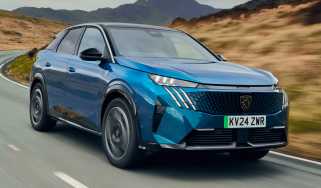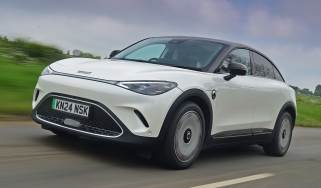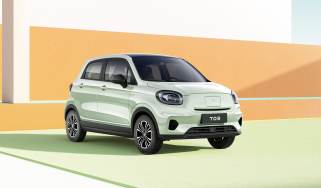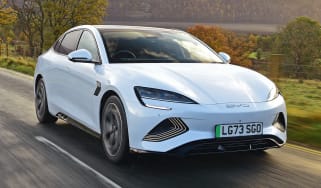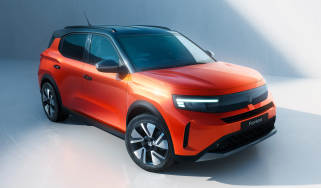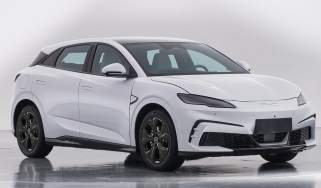Best electric cars to buy 2024
These are the EVs that should be on your shortlist if you’re thinking about making the switch
Pressure is mounting on UK motorists to ditch their fossil-fuelled petrol or diesel cars and switch to electric cars. From the cheapest electric cars on sale to family SUVs and luxurious premium brand models, EVs are becoming more appealing and accessible to every type of driver. But which are the best electric cars available to buy right now?
As luck would have it, we're here to help. We’ve extensively tested every new EV on sale and below you’ll find a summary of our top 10 current favourites, along with plenty of useful advice to help you make the switch to electric.
The best electric cars to buy now
This is our pick of the current electric car crop. As usual, in picking the best EVs on the market our experts looked at the full package from price and running costs to design, practicality, technology and the overall driving experience. We've included a variety of vehicle types so our top 10 includes something for everyone. Here it is in reverse order...
10. BMW i5
- Prices from £68,000
The first entry from BMW on this list is the all-electric i5. Not only does the i5 offer outstanding cruising comfort, but it takes a step closer to its i7 sibling in terms of technology and refinement. However you view the i5, you can’t deny that it has all the qualities of a fantastic executive car, from the materials used to its driving dynamics.
Only two i5 variants are on offer, the most common eDrive40 has an 81.2kWh battery and single motor producing 335bhp and 400Nm of torque, it's capable of completing the 0-62mph dash in six seconds flat. Range is pretty solid as well, albeit not class leading. You should see north of 300 miles in mixed driving conditions. When the road gets twisty the i5 feels planted and offers plenty of grip, but it really excels in overall ride comfort and refinement.
9. Citroen e-C4 & e-C4 X
- Prices from £32,500
Citroen has always been known for offering high levels of comfort and quirkiness, and this applies to its all-electric family car – whether you opt for the e-C4 hatchback or the e-C4 X saloon. Both variants claim over 200 miles of battery range, too, and this should prove more than enough for most everyday needs. When you do need to top the battery up, the 100kW rapid-charging capability will allow you to complete a 10-80 per cent charge in as little as 30 minutes.
The combustion-powered C4 was voted as the best car to own in our 2023 Driver Power customer satisfaction survey, so it’s a safe bet that the e-C4 and e-C4 X will offer similarly pleasing experiences.
8. BYD Dolphin
- Prices from £30,000
BYD is an electric car goliath at home in China, but here in the UK it’s still an emerging name in the new car market. After a strong start with the Atto 3 SUV, the brand’s second car, the Dolphin, is another genuinely impressive EV with a very tempting sub-£30k price tag.
It may be quite cheap for an EV, but the BYD’s build quality feels solid. What’s more, even the entry-level model can return over 200 miles of range from its 45kWh battery. There’s plenty of tech on offer, too, with the centrepiece being a rotating 12.3-inch touchscreen. We do think the rotation is a bit of a gimmick, but the infotainment system itself is very responsive to use. On top of this, the Dolphin is easy to drive and offers plenty of space for its size, too.
7. Porsche Taycan
- Prices from £86,500
Simply put, the Porsche Taycan is a massively capable and desirable electric car which drives and feels exactly like a Porsche should. While the Taycan does come at a price premium, the Porsche engineers have delivered a driving experience that few other EVs at any price can come close to matching.
Despite the inevitable extra weight compared to petrol powered Porsche sports cars, the four-door Taycan retains the brand’s trademark agility and performance. With up to 1,020bhp in the Turbo GT variant and a range of up to 421 miles if you opt for the 97kWh Performance Battery Plus unit, it’s a hugely impressive machine.
6. Volkswagen ID.7
- Prices from £56,000
- Best for practicality
Volkswagen’s electric line-up is already quite a substantial one, but the ID.7 is the German brand’s best zero-emissions effort yet. This executive car offers plenty of battery range, practicality and quality, all of which allow it to take on fierce rivals like the Tesla Model 3. If you’re searching for a new family car, you can even have one in estate car form (known as the ID.7 Tourer).
Whichever version you choose, the VW ID.7 is a big car. It’s longer than the ID. Buzz MPV which means there’s plenty of passenger and luggage space inside. The 77kWh battery is pretty sizable, too, and the car claims up to 383 miles of range per charge, depending on spec. One of the most common criticisms of the latest VWs is the infotainment system and lack of switchgear, and while the ID.7’s setup still isn’t perfect, it’s a big improvement that’s easy to use and backlit to make it easily visible at night.
5. BMW i4
- Prices from £51,000
The BMW i4 is a great example of why keen drivers needn’t be concerned about an all-electric future. Despite weighing more than two tonnes, the i4 is superb through the corners with lots of grip, a precise steering feel and no understeer.
The rear-wheel-drive models produce between 282bhp-335bhp, and offer up to 365 miles of range, while the i4 M50 gets a dual-motor set-up for all-wheel drive, plus a highly potent maximum output of 536bhp and 795Nm of torque. It’s not only in the bends that the i4 impresses; the cabin oozes quality and is packed with the latest on-board technology. Ride comfort and refinement are also both excellent, adding to i4’s appeal as a superb all-rounder.
4. Tesla Model 3
- Prices from £40,000
With its long range, mind-boggling performance and minimalist, hi-tech cabin, it’s not hard to understand why the Tesla Model 3 has been such a hit since it landed in 2019. In fact you’ll struggle to not stumble across a dozen Model 3s wherever you go in Britain these days.
The Model 3’s midlife facelift only added to its appeal by increasing the official battery range – up to 319 miles for the entry-level rear-drive model – while new acoustic glass, quieter tyres and sound-deadening materials boosted the level of refinement.
The 15.4-inch touchscreen has also been given a more usable screen area, while the interior and build quality have also been improved. One controversial element is the lack of indicator stalks, which have been replaced by steering-wheel buttons that we found awkward to use.
3. MG4
- Prices from £27,000
In just a few years, the MG brand has been revitalised as a maker of affordable EVs that offer near-unbeatable value for money. That philosophy is perfectly encapsulated in the MG4, the winner of our Affordable Electric Car of the Year award for 2023. The MG4 starts from just under £27,000 and yet the only obvious signs of cost-saving are a few cheaper-feeling materials inside.
The standard kit list is lengthy, with every model featuring a 10.25-inch touchscreen, smartphone connectivity, LED headlights and adaptive cruise control. There’s also plenty of space on offer for passengers and luggage. The MG4 is a blast to drive along a twisty back road, while its light steering and good forward visibility make it a cinch to manoeuvre around town.
There are three standard powertrain options, all of which use a single electric motor to power the rear wheels. The entry-level SE claims up to 218 miles of range, the Long Range boosts this figure to 281 miles, and the Extended range tops out at 323 miles.
Alternatively, those looking for a little more power also have the MG4 XPower to consider, which offers 429bhp and 600Nm of torque. Overall range is slightly lower than the standard car, with MG claiming the XPower will return 239 miles of range, but this is still pretty impressive for such a rapid car.
2. Volvo EX30
- Prices from £34,000
- Best value for money
The Volvo EX30 is a bit of a weird car, but please hear us out. It wears a premium badge, it’s an electric SUV, it’s well built, well kitted-out, great to drive and can return up to 295 miles on a single charge. So far so good, but now here comes the unusual bit: you can pick one up brand-new for under £35,000. That makes this Volvo one of the cheaper brand-new EVs on the UK market, as well as one of the best ones.
Yes, there are a number of fully-electric models that undercut this price, but very few of these match the EX30’s size and practicality. Fewer still can match the level of quality on offer. The Volvo is a genuinely great buy, we just wish it was a bit less reliant on its touchscreen to control basic functions.
1. Hyundai Kona Electric
- Prices from £35,000
The Mk2 Hyundai Kona is our favourite small SUV on sale right now, not to mention our 2023 Car of the Year. However, it’s the Kona Electric which is the most mature and well rounded car of the range, from its road manners to the interior. The entry-level Standard Range model starts from less than £35,000 and offers up to 234 miles from its 48kWh battery.
The original Kona was already a hit with customers, but the model was a bit constrictive in terms of size. Now, though, the new car sits on the same platform as the Kia Niro, so there’s more space on offer along with a whole suite of improvements including a much bolder new look, upgraded on-board technology and higher-quality materials.
Step inside and the dashboard is now dominated by two 12.3-inch screens that run on brand-new software. Hyundai hasn’t shied away from physical controls, though, as there are still buttons for systems such as the climate control and radio.
For those who want to cover more miles, the Long Range model’s larger 65kWh battery boosts the range to 319 miles. Rapid-charging capabilities aren’t as groundbreaking as Hyundai’s Ioniq 5, but a 10-80 per cent top-up takes less than 45 minutes. Every Kona Electric sold in the UK comes with an efficiency-boosting heat pump fitted as standard, too.
Top 10 best electric cars
- Hyundai Kona Electric
- Volvo EX30
- MG4
- Tesla Model 3
- BMW i4
- Volkswagen ID.7
- Porsche Taycan
- BYD Dolphin
- Citroen e-C4 & e-C4 X
- BMW i5
More great electric cars
With the range of electric car choices expanding so rapidly, competition to get into our overall best electric cars top ten list is fierce to say the least. Naturally a lot of very fine electric vehicles miss the cut so here are a few of the best ones that nearly made it.
If you need more assistance in narrowing down your electric car shortlist, click the links below.
- Best small electric cars
- Best electric SUVs
- Longest range electric cars
- Fastest charging electric cars
- Cheapest electric cars
BMW iX
- Prices from £71,000
Put your thoughts about the BMW iX’s admittedly divisive styling aside for a moment, because it’s one of the most capable and impressive electric cars money can buy. This 2.4-tonne luxury SUV is superb to drive. It’s surprisingly agile and offers decent steering feel, while at the same time soaking up almost any bump in the road.
Every iX has a dual-motor set-up for four-wheel drive, with even entry-level xDrive40 models producing 322bhp and 630Nm of torque, meaning 0-62mph takes just 6.1 seconds. The cabin quality is high and the two 14.5-inch curved screens have BMW’s latest iDrive infotainment.
BYD Atto 3
- Prices from £38,000
BYD has already hit the ground running when it made its uk debut with the Atto 3. Along with its smart appearance and comfortable ride, there’s even an element of luxury when you take a seat inside this electric SUV.
You’d be forgiven for looking straight past all of these qualities, though, as the Atto 3 is chock-full of quirky features. When it comes to musical entertainment, Spotify is included as standard and accessed via a rotating centre touchscreen – but if you’d prefer a live gig, the door pocket strings are designed to act as a playable guitar. If fitness is more of your thing, the gear selector, air vents and door handle designs are all inspired by weightlifting equipment. Early versions of the Atto 3 even incorporated the aspirational “Build Your Dreams’ slogan on the car's tailgate, but this has since been dropped after listening to customer feedback.
Novelties aside, the Atto 3 still has plenty of sensible qualities, including a full five-star Euro NCAP safety rating. The 60.5kWh battery is good for a range of 260 miles on the WLTP combined cycle, and the 150kW rapid charging capability allows it to be topped up from 30 to 80 per cent in under half an hour.
Cupra Born
- Prices from £34,000
The Born is from SEAT’s sporty sub-brand Cupra, and this electric hot hatch is based on similar technology to the VW ID.3. It’s got a sharp, stylish look and feel, a choice of 201bhp or 227bhp powertrain options and, perhaps most importantly, that all-important fun factor. The ride is a little firm though.
Fiat 500
- Prices from £28,000
The Fiat 500 nails its city car brief perfectly; it's competitively priced and offers low running costs along with plenty of Italian flair. Although the third generation car is a little bigger than its combustion-engined predecessor, the 500 is still at home darting through urban traffic. You shouldn't have any trouble parking, either, as even the entry-level models come with rear parking sensors as standard.
Ford Mustang Mach-E
- Prices from £43,500
The Ford Mustang Mach-E is nothing like its iconic sports car namesake, but it's a well-crafted electric SUV that still offers a breadth of skills. And, if you're after more pace, the 480bhp Mach-E GT performance model is even faster, and boasts 'MagneRide' adaptive suspension. Step inside and there’s a generous helping of standard kit, along with decent practicality.
Hyundai Ioniq 5
- Prices from £43,500
Hyundai’s upmarket ambitions were comprehensively realised by the arrival of the Ioniq 5, and the model continues to trouble premium rivals such as the Audi Q4 e-tron and Tesla Model Y. Make no mistake, the Ioniq 5 is an impressive and capable car across the board, combining next-gen electric car tech along with some of the very best battery performance and charging abilities available on the market.
Two battery options and three power outputs are available. The entry 58kWh battery is paired with a single 168bhp motor driving the rear wheels, delivering a 0-62mph time of 8.5 seconds and a range of 238 miles. The 225bhp mid-spec version offers the best range, with a 77.4kWh battery increasing the total distance able to be covered on a single charge to 315 miles. The top-spec variant uses the same battery, but adds a second motor at the front, giving a combined total of 321bhp. Overall range falls slightly to 298 miles, although performance is much improved with 0-62 taking 5.1 seconds.
Featuring a superb infotainment system and generous standard kit, the Ioniq 5 has the available space, practicality and comfort, too, so you’ll relish the chance to rack up the miles.
Hyundai Ioniq 6
- Prices from £47,000
Following on from the multi-award-winning Ioniq 5 certainly wasn’t an easy task, but Hyundai has managed to make further advancements with the Ioniq 6. While the two cars share a number of features under the skin, this curvy saloon has been designed to be as aerodynamic as possible in order to maximise efficiency.
The result is a claimed battery range of 338 miles – dropping slightly to 322 miles if you opt for the all-wheel-drive version. When you do need to top up, the E-GMP platform’s electronics will allow you to charge from 10 to 80 per cent in as little as 18 minutes when using a 220kW rapid-charger.
Kia EV6
- Prices from £45,500
The Kia EV6 is the sister vehicle to the Hyundai Ioniq 5, so it's a great pick if you love that model's technology, but aren't quite as sold on its retro-futuristic looks. The EV6 is arguably the more conventional of the two, and it's a bit lower and more sporting. This is reflected in its handling, with slightly firmer suspension offering sharper responses.
It's offered either in RWD or AWD form, along with a high-performance GT version, with the entry-level model being our current favourite. Not only does it offer a claimed range figure of up to 328 miles from its 77.4kWh battery, but we also found its 7.3-second 0-62mph time to be quick enough.
MG ZS EV
- Prices from £30,500
MG’s pitch to UK car buyers is based around value, and the MG ZS EV fits that brand ethos to a tee. While it doesn’t stand out in terms of its technology or driving experience, the ZS EV is competent in these areas and a suitable alternative if you aren’t quite sold on the MG4. The car’s real strength lies in its practicality, affordability and long warranty.
Nissan Ariya
- Prices from £40,000
As a previous Auto Express Car of the Year award winner, the Nissan Ariya still offers the stellar combination of practicality, quality and refinement that greatly impressed us when it first arrived. The electric SUV market is moving fast and some rivals have started to edge ahead of the Ariya, but it is still well worth considering. Not only does Nissan’s zero-emission family car claim up to 329 miles of battery range, but it’s surprisingly enjoyable to drive as well.
Skoda Enyaq
- Prices from £40,000
The Enyaq is an all-electric family car that is typically Skoda: that is to say it's practical, well-equipped, comfortable and decent to drive. With top-spec models able to cover over 300 miles from a full charge, it soothes any range anxiety and just gets on with being an excellent family car – that just happens to run on battery power.
How to choose an electric car: our top tips
Although some drivers may be a little hesitant about moving to electric power, the selection of models to choose from is only increasing and so are their capabilities. It means there’s likely to be an EV with the price, range, practicality and performance to suit most requirements.
With the UK’s 2035 petrol and diesel ban looming into view, manufacturers now offer everything from small, city car sized EVs like the Fiat 500 to luxury models like the BMW i7. The mid-size family car segment is where the choice is most rapidly expanding – and battery range is becoming less of an issue when compared to a couple of years ago. Many EVs now do well over 300 miles on a charge.
With more electric cars and brands entering the UK market, prices are starting to drop. Some of the brands might not be household names in Europe but Chinese EVs, such as the BYD Atto 3, are among the biggest bargains at the moment and can rival the biggest names in the industry when it comes to in-car kit and build quality. Our current Affordable Electric Car of the Year, the MG4 hatchback, can be bought for well under £30,000, yet it offers many of the same features as pricier rivals like the Volkswagen ID.3.
The choice of new electric cars on sale to consumers will only continue to expand as more manufacturers get on board with the technology in preparation for tightening emissions regulations in the UK and other countries.
At the same time, the electric car-charging infrastructure in the UK is improving, making electric cars more viable for more people. The wider availability of fast and rapid chargers at homes and workplaces, as well as in public spaces, means it's easier than ever to make the swap into a BEV (Battery Electric Vehicle) and enjoy its lower running costs with relatively little inconvenience. Even if you can’t manage with a pure EV, today’s hybrids and plug-in hybrids offer a good halfway-house option.
There are other benefits to pure-electric motoring besides the environmental ones – you’ll be exempt from London’s Congestion Charge and from paying road tax. You’ll also avoid having to pay the ULEZ charge, too. Electric cars remain more expensive to buy than their combustion engined counterparts, especially now the plug-in car grant has been axed, but running costs have been shown to be as much as 60 per cent less for electric cars than they are for petrol and diesel ones, even with the rising cost of electricity.
Here's everything you need to make your electric car choices. For more information check out our full guide to living with an EV...
1. Decide whether an electric car will suit your lifestyle
Electric cars are not for everybody. Although the public charging infrastructure in the UK is improving quickly, regular long trips in an electric car can still prove problematic. The perfect usage pattern for an EV involves charging at home overnight when electricity tariffs are lower and not needing to top up the battery again during the day.
Ideally, you’ll need somewhere to charge at home, but you could get around this if there are EV charging points at work or plenty of public charging points nearby. If you do less than 200 or so miles a week, you could get away without having a home or work charger at all; just visit a public one every few days to top up.
If your average daily mileage exceeds the range of your electric car, we’d advise you to think twice, but the occasional longer trip should be perfectly manageable. As the technology improves and the average range of electric cars grows, more and more people will find that they could live quite happily with an electric car.
2. Don’t be put off by high electric car prices, running costs are the key
The list prices of electric cars can look expensive compared to equivalent petrol or diesel models, but looks are very likely to be deceiving. List prices are just one part of the cost of vehicle ownership and the overall cost becomes much more palatable when you factor-in the relatively low running costs of EVs – often around 60 per cent of those of a similar petrol model depending on usage patterns.
As a general rule, charging an electric car is cheaper than fuelling a petrol or diesel one – even if you use more expensive public charging points. The gap has narrowed in recent times with the rising cost of electricity but most electric car owners will still save by charging an EV at home rather than buying petrol or diesel for an equivalent car.
Free VED (road tax), company car tax advantages and the lower maintenance costs that result from EVs having fewer moving parts will also help to offset the higher upfront price over time.
3. Don’t worry about electric car practicality
There was a time when the majority of electric cars were conventional models with the internal combustion engine powertrain swapped out for an electric motor and batteries. This led to all sorts of compromises in terms of interior and boot space. But today, electric cars tend to be built on purpose-designed platforms that are created either purely for electric vehicles or to accommodate various kinds of propulsion systems. The end result is that electric cars deliver boot and passenger space equivalent to petrol and diesel rivals.
4. Enjoy the electric car driving experience
Electric cars tend to be heavier than petrol and diesel models, which means they can feel less nimble on twisty roads, but there are a whole host of benefits to the way they drive that many people will find preferable.
For a start you get near-silent cruising with next-to-no sound from the electric motors. In traffic, the car slows itself when you lift off the throttle thanks to regenerative braking, so it’s possible to drive around town using just one pedal, hardly ever touching the brake. It all makes for a very relaxed experience, yet the instant torque provided by the electric motor means that even everyday EVs can get you out of tricky situations quickly and also have the potential to leave a hot hatch standing when pulling away from the traffic lights and in some cases, supercars too.
In some ways, owning an EV means you have to change the way you think about driving. You automatically adopt a gentler, more relaxed style that maximises your range and often means you reach your destination feeling more refreshed than you would do otherwise.
Are electric cars environmentally friendly?
Electric cars have zero exhaust or tailpipe emissions so they don’t produce the localised NOx and particulate emissions that have a damaging effect on air quality in urban areas. However, the overall environmental credentials of an electric car depend greatly on the source of the electricity used to charge it. As the energy mix of the National Grid moves towards renewable sources like solar, wind and tidal power and away from fossil fuels, electric cars get greener. Green NCAP has published whole life emissions estimates for various cars with small electric vehicles performing better than any ICE cars.
Are electric cars reliable?
Electric cars are still selling in relatively small numbers and we haven’t seen enough of them doing significant mileages to make a firm judgement on reliability. What we do know is that EVs have fewer moving parts than conventional cars and there’s little evidence from hybrid or electric cars that battery performance degrades substantially with use, although you are likely to see a gradual reduction in capacity.
How much do electric cars cost to tax?
Pure-electric cars are free to tax until April 2025. You need to go through the process of taxing your electric vehicle although you won’t be required to pay anything. After this deadline, EVs will face a yearly VED charge.
Which electric cars have the longest range?
With ever-improving battery technology, electric cars are increasing their ranges. The MG4 is one of the more affordable EVs but it still has an official range of up to 323 miles, which should be plenty for most drivers. At the other end of the scale, pricier models such as the Mercedes EQS and Tesla Model S can offer well over 400 miles. Check out our list of the longest range electric cars.
The UK electric car market: history and future
Electric cars have been around for well over a century but it’s only recently that they’ve started to gain a market foothold. In the early noughties, the Reva G-Wiz led the electric car craze, although that model hardly qualified as a car at all, as it was classed as a quadricycle. It used basic lead-acid batteries, similar to the electric milk floats that once frequented British streets in the early hours, and was slow, cramped and not very safe. It wasn't until the original Nissan Leaf came along that the process of electric car development went into overdrive.
As a five-door, five-seat hatchback, the Leaf offered the practicality of a conventional family car, and became the best-selling EV, albeit with sales figures significantly lower than its petrol and diesel counterparts. Initially the Leaf's range was 80 miles at best, but constant development and improvement have seen that range increase, while the arrival of the Leaf Mk2 in 2018 saw the car gain a range closer to that of a conventional petrol car.
Seeing the success of the Leaf, rival car makers got in on the act and introduced their own EVs. Hyundai, Kia, Peugeot, Citroen, Renault, Ford and Volkswagen were among the first brands to join the electric revolution, along with Polestar, and BMW, which has its own 'i' EV sub-brand. Tesla helped shape the market with its range of all-electric cars, while prestige makers Audi, Mercedes and Genesis began producing their own luxury EVs, and various companies are building low volume all-electric hypercars. Today, the UK's 2035 ban on the sale of new petrol and diesel cars is focusing minds and the number of brands without an all-electric offering is small and shrinking. There will only be more to come.
Looking into the future, you can only see the electric car market expanding, and fast. With comprehensive manufacturer buy-in fuelled by tightening emissions regulations from governments, electric car technology is improving fast – along with the infrastructure that makes running one easier. You might not be considering an electric car now but it’s a safe bet that you will be in the future.
Already own an EV? Read our guide to electric car charging in the UK…
